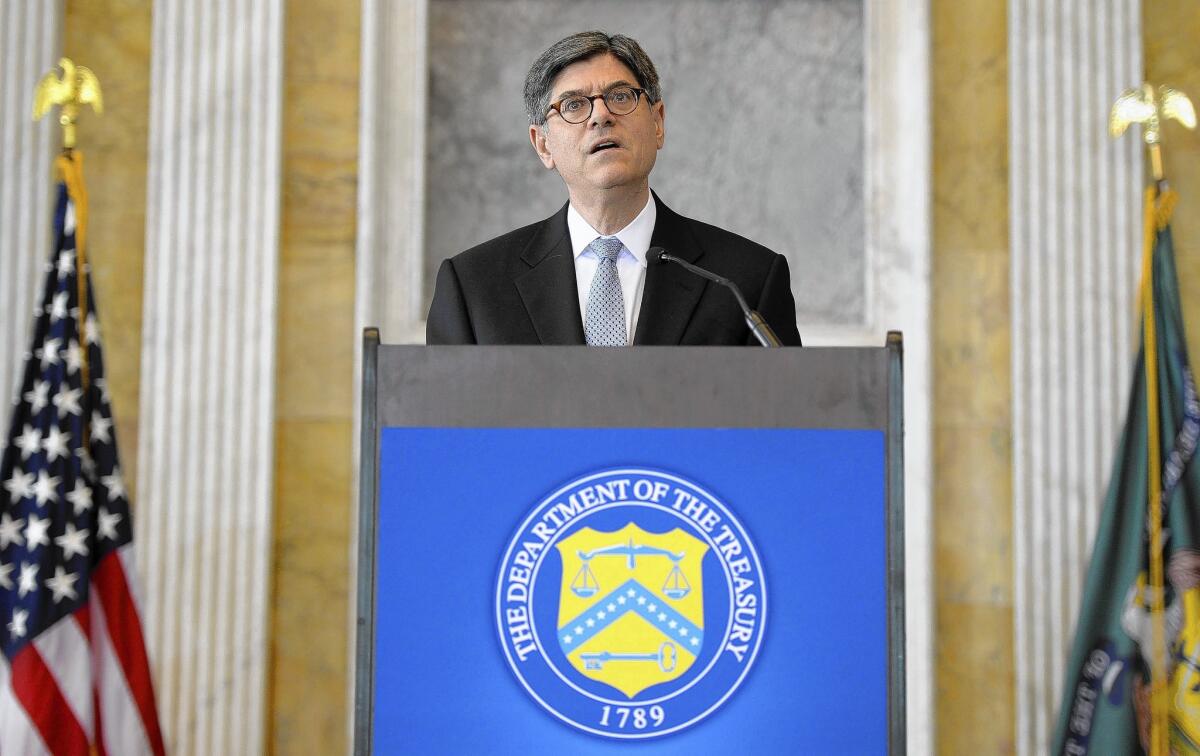Treasury chief urges reforms to keep firms from dodging U.S. taxes

- Share via
Reporting from washington — As Congress returned to work this week, Treasury Secretary Jacob J. Lew sent an urgent reminder to lawmakers: It is “imperative” they act now to reduce the number of corporations relocating overseas to avoid paying U.S. income taxes.
In challenging Congress to stem the tax dodge, Lew said Monday that the Obama administration was close to deciding whether to issue an executive order that would make it “less economically appealing” to engage in what are known as inversions.
This year, especially, huge multinational corporations including pharmaceutical firm AbbVie Inc. and Burger King Worldwide Inc. have agreed to buy smaller companies in foreign countries with much lower tax rates and move their headquarters there, sheltering billions of dollars from U.S. taxes.
The corporate moves have occurred as Congress has failed to address reforms in the corporate tax laws. Lew’s call for legislation isn’t likely to move lawmakers much, especially before the mid-term elections in November.
So the administration could try to stem the tide by issuing an executive order, and a decision on that could come “in the very near future,” Lew said in a speech Monday at the Urban Institute think tank.
But he cautioned that there are limits to what the administration can do without Congress.
“Any action we take will have a strong legal and policy basis, but will not be a substitute for meaningful legislation — it can only address part of the economics,” Lew said. “Only a change in the law can shut the door, and only tax reform can solve the problems in our tax code that lead to inversions.”
Democratic legislation is stalled in the House and Senate because of Republican insistence that the issue be addressed as part of a broad overhaul of corporate taxes.
The administration also would like to deal with the issue through such an overhaul, Lew said. But with inversions happening more frequently, “we cannot wait to complete business tax reform before taking action to fix this problem,” he said.
It’s unclear what executive actions can be taken that would discourage inversions. Any steps short of changing the law are likely to be “relatively symbolic and toothless,” said Chris Krueger, a senior analyst at financial services firm Guggenheim Partners.
But talk of new retroactive limits on inversions is causing corporations to reconsider such moves, he said.
Treasury officials looking into possible regulatory steps are “completing an evaluation of what we can do to make these deals less economically appealing,” Lew said.
Inversions by U.S. companies have become more popular as many nations have taken steps to be more business-friendly, leaving the U.S. with the highest corporate tax rate — at 35% — among developed economies.
In recent months, Burger King announced it would shift its headquarters from Miami to Canada after it buys Tim Hortons Inc., and AbbVie in Illinois said it would reincorporate on the British island of Jersey after buying European rival Shire.
The administration has been sharply critical of such moves because the firm remains largely in the U.S. but changes its address for tax purposes. The White House wants new limits that would apply to any inversions that took place after early May, Lew said.
“This practice allows the corporation to avoid their civic responsibilities while continuing to benefit from everything that makes America the best place in the world to do business — our rule of law, our intellectual property rights, our support for research and development, our universities, our innovative and entrepreneurial culture and our skilled workforce,” Lew said Monday.
“This may be legal, but it is wrong, and our laws should change,” he said, echoing his comments in July calling for U.S. companies to show “economic patriotism” to slow the “breakneck speed” at which inversions are occurring.
Sens. Charles E. Schumer (D-N.Y.) and Richard J. Durbin (D-Ill.) are expected to propose new legislation this week aimed at reducing interest deductions for inverted companies. The bill would apply to companies that inverted since 1994.
Republicans probably will block a vote, and chances of any stand-alone inversion legislation passing this year is less than 10%, analyst Krueger said.
More to Read
Inside the business of entertainment
The Wide Shot brings you news, analysis and insights on everything from streaming wars to production — and what it all means for the future.
You may occasionally receive promotional content from the Los Angeles Times.











